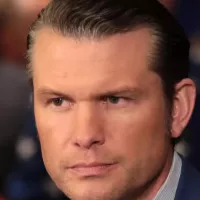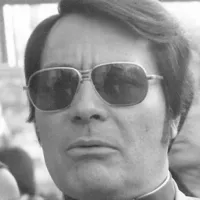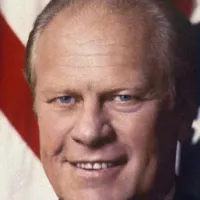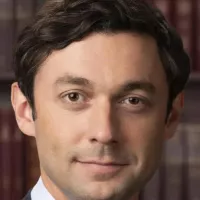Harvey Milk was a pioneering American politician and activist. He made history as the first openly gay man elected to public office in California, serving on the San Francisco Board of Supervisors. Milk's political career, though tragically short, was marked by his advocacy for LGBTQ+ rights and social justice. He championed ordinances protecting gay rights and fought against discrimination. Milk's assassination, along with Mayor George Moscone, shocked the nation and solidified his status as a martyr for the gay rights movement. His life and legacy continue to inspire activists and politicians fighting for equality and representation.
May 22, 1930: Harvey Milk's Birth
On May 22, 1930, Harvey Bernard Milk was born. He would later become an American politician and the first openly gay man elected to public office in California.
October 18, 1946: Jack Galen McKinley's Birth
October 18, 1946 marks the birthdate of Jack Galen McKinley, who later had a relationship with Harvey Milk.
1947: Graduation from Bay Shore High School
In 1947, Harvey Milk graduated from Bay Shore High School in Bay Shore, New York, marking the completion of his secondary education.
1951: Completion of Studies at New York State College for Teachers
In 1951, Harvey Milk completed his studies at New York State College for Teachers in Albany, now the State University of New York at Albany, where he majored in mathematics and wrote for the college newspaper.
1955: Resignation from the Navy
In 1955, Harvey Milk resigned from the United States Navy at the rank of Lieutenant (junior grade). He was forced to accept an "other than honorable" discharge rather than face a court-martial due to his homosexuality.
1956: Meeting Joe Campbell
In 1956, Harvey Milk met Joe Campbell at Jacob Riis Park beach in Queens, a popular location for gay men.
1961: Separation from Joe Campbell
In 1961, after almost six years together, Harvey Milk and Joe Campbell separated.
1962: Relationship with Craig Rodwell
In 1962, Harvey Milk began a relationship with Craig Rodwell. The relationship ended due to Milk's discomfort with Rodwell's involvement in the New York Mattachine Society.
October 22, 1963: McKinley Leaves Hometown
On October 22, 1963, Jack Galen McKinley left his hometown to be with Harvey Milk. Milk then recruited McKinley to work on conservative Republican Barry Goldwater's 1964 presidential campaign.
1964: McKinley Works on Goldwater Campaign
In 1964, Jack Galen McKinley worked on conservative Republican Barry Goldwater's presidential campaign after being recruited by Harvey Milk.
1968: Alioto attracts big corporations
Since 1968, Mayor Joseph Alioto had been luring large corporations to the city despite what critics labeled "the Manhattanization of San Francisco".
1969: Brown Pushes for Legalization of Sex
In 1969, Assemblyman Willie Brown pushed for legalization of sex between consenting adults in California, but was unsuccessful.
1969: Arrival in San Francisco
In 1969, Harvey Milk and Jack Galen McKinley arrived in San Francisco with the Broadway touring company of Hair. Milk decided to stay after McKinley left for a job in New York City.
1970: Milk Fired for Refusing to Cut Hair
In 1970, Harvey Milk was fired from his job at an investment firm for refusing to cut his hair, due to his increasing frustration with the political climate after the U.S. invasion of Cambodia.
1970: Increased Arrests for Public Sex
In 1970, nearly 90 people in San Francisco were arrested for having sex in public parks at night due to Mayor Alioto's request to target the parks.
1971: Arrests for Public Sex in San Francisco
In 1971, 2,800 gay men were arrested for public sex in San Francisco. This high number contrasted sharply with New York City, which only recorded 63 arrests for the same offense that year.
1971: Hongisto's Win
In 1971, Ex-policeman Richard Hongisto won the race for sheriff. His win in 1971 showed the political clout of the gay community, which raised significant funds for his campaign.
1971: Milk as a Protester
In 1971, Harvey Milk was exuberantly protesting on Christopher Street Day in New York City and met Scott Smith, beginning another relationship.
1971: Formation of Alice B. Toklas Memorial Democratic Club
In 1971, Jim Foster, Rick Stokes, and David B. Goodstein formed the Alice B. Toklas Memorial Democratic Club, known as "Alice," to influence liberal politicians.
1972: Feinstein Supports Anti-Discrimination Ordinance
In 1972, Del Martin and Phyllis Lyon obtained Dianne Feinstein's support for an ordinance outlawing employment discrimination based on sexual orientation, aided by the Alice B. Toklas Memorial Democratic Club.
1972: Milk Moves to San Francisco
In 1972, Harvey Milk moved to San Francisco and opened a camera store in the Castro district. This neighborhood was experiencing a mass immigration of gay men and lesbians.
March 1973: Opening of Castro Camera
In March 1973, Harvey Milk and Scott Smith opened a camera store called Castro Camera on Castro Street with their last $1,000 after a roll of film Milk left at a local shop was ruined.
1973: First campaign for supervisor
In 1973, Harvey Milk, a self-proclaimed "born politician", ran for supervisor. He promoted financial management, individual empowerment, and reorganization of supervisor elections to district ballots. He advocated for cultural liberalism, opposing government interference in private sexual matters and favoring marijuana legalization. Despite lacking experience, his speeches and media skills garnered significant press, earning him 16,900 votes and 10th place out of 32 candidates.
1973: Dispute Over Sales Tax and Decision to Run for Supervisor
In 1973, an incident involving a state sales tax deposit at Milk's store, Castro Camera, coupled with frustration over government priorities and the Watergate hearings, led Harvey Milk to decide to run for city supervisor.
1973: Formation of the Castro Village Association
In 1973, when two gay men were prevented from opening an antique shop, Harvey Milk and other gay business owners established the Castro Village Association, with Milk as president.
1974: Organizing the Castro Street Fair
In 1974, Harvey Milk organized the Castro Street Fair to attract customers to gay businesses in the area. The fair attracted over 5,000 attendees, exceeding the business done by Eureka Valley Merchants Association members on any previous day.
September 22, 1975: Sipple saves President Ford
On September 22, 1975, Oliver "Bill" Sipple, ex-lover of Milk's, saved President Gerald Ford from an assassination attempt. Milk used this opportunity to highlight the heroic acts of gay people and improve public perception, disclosing Sipple's sexuality to a newspaper.
1975: Moscone elected mayor, Milk appointed city commissioner
In 1975, George Moscone was elected mayor and acknowledged Milk's influence by offering him a city commissioner position. Milk finished seventh in the election, narrowly missing a supervisor seat.
1975: Second campaign for supervisor
In 1975, Harvey Milk ran again for supervisor. He adopted a more conventional approach by cutting his hair, abstaining from marijuana, and avoiding gay bathhouses. Milk gained support from the teamsters, firefighters, and construction unions. His store, Castro Camera, became a hub for his campaign activities.
November 1976: Supervisor elections reorganized
In November 1976, voters in San Francisco decided to reorganize supervisor elections, choosing supervisors from neighborhoods instead of citywide ballots.
1976: Peoples Temple
In 1976 Milk accepted Temple volunteers to work his phones.
1976: Milk Appointed to Board of Permit Appeals
In 1976, newly elected Mayor George Moscone appointed Harvey Milk to the Board of Permit Appeals, making him the first openly gay city commissioner in the United States.
June 21, 1977: Robert Hillsborough's murder
On June 21, 1977, Robert Hillsborough was murdered, stabbed 15 times, while his attackers shouted anti-gay slurs. Mayor Moscone and Hillsborough's mother blamed Anita Bryant and John Briggs. One week prior, Briggs had referred to San Francisco as a "sexual garbage heap".
November 8, 1977: Milk wins supervisor election
On November 8, 1977, Harvey Milk won the supervisor election by 30% against sixteen other candidates. He arrived on Castro Street on his campaign manager's motorcycle, escorted by Sheriff Richard Hongisto, to a large welcome.
1977: Election to City Supervisor
In 1977, Harvey Milk was elected as a city supervisor after San Francisco changed its election system to choose neighborhood representatives. He then sponsored a bill banning discrimination based on sexual orientation in public accommodations, housing, and employment.
1977: Dade County civil rights ordinance and reaction
In 1977, activists in Miami, Florida passed a civil rights ordinance that made discrimination based on sexual orientation illegal in Dade County. Christian fundamentalists responded with the 'Save Our Children' campaign led by Anita Bryant, which successfully overturned the ordinance.
1977: Castro residents protest Dade County ordinance vote
In 1977, following the overturning of the Dade County ordinance, 3,000 Castro residents demonstrated. Milk led a five-mile march, declaring that Anita Bryant would create a national gay force.
February 19, 1978: Milk defends Jim Jones
On February 19, 1978, Harvey Milk wrote a letter to President Jimmy Carter defending cult leader Jim Jones as "a man of the highest character" when asked. Milk's relationship with the Temple was similar to other politicians' in Northern California.
November 7, 1978: Proposition Lost by More Than a Million Votes
On November 7, 1978, a proposition lost by over a million votes, stunning gay activists on election night. In San Francisco, 75% voted against it.
November 10, 1978: Dan White Resigns from Board of Supervisors
On November 10, 1978, Dan White resigned from his position on the San Francisco Board of Supervisors, citing that his annual salary of $9,600 was insufficient to support his family.
November 27, 1978: Harvey Milk's Death
On November 27, 1978, Harvey Milk was assassinated. He was an American politician and the first openly gay man to be elected to public office in California, as a member of the San Francisco Board of Supervisors.
1978: Gay Freedom Day Parade
During the summer of 1978, attendance at Gay Pride marches swelled. Harvey Milk rode in an open car carrying a sign saying, "I'm from Woodmere, N.Y." and gave a version of his famous "Hope Speech."
1978: Harry Britt's Eulogy
Following Harvey Milk's assassination in 1978, Harry Britt summarized Milk's impact, stating, "No matter what the world has taught us about ourselves, we can be beautiful and we can get our thing together ... Harvey was a prophet ... he lived by a vision ... Something very special is going to happen in this city and it will have Harvey Milk's name on it."
1978: Briggs' anti-gay bill
In 1978, California State Senator John Briggs, motivated by the success of Christian fundamentalists in Miami, wrote a bill that would ban gays and lesbians from teaching in California public schools. He maintained that it was just politics.
1978: Campaign against Proposition 6
In 1978, Harvey Milk campaigned against Proposition 6, dubbed the "Briggs Initiative", throughout California. This proposed law would have made firing gay teachers mandatory. Milk debated Briggs, countering his claims with statistics and jokes.
1978: Harvey Milk Memorial Gay Democratic Club Founded
In 1978, the San Francisco Gay Democratic Club changed its name to the Harvey Milk Memorial Gay Democratic Club, which is currently named the Harvey Milk LGBTQ Democratic Club. It is recognized as the largest Democratic organization in San Francisco.
May 21, 1979: Dan White Acquitted of First-Degree Murder
On May 21, 1979, Dan White was acquitted of the first-degree murder charge but found guilty of voluntary manslaughter in the deaths of Milk and Moscone. He was sentenced to seven and two-thirds years in prison and cried upon hearing the verdict.
1982: The Mayor of Castro Street Published
In 1982, Randy Shilts completed his biography of Milk, titled "The Mayor of Castro Street".
January 7, 1984: Dan White Released From Prison
On January 7, 1984, Dan White was released from prison after serving just over five years for the double homicide of Moscone and Milk.
1984: The Times of Harvey Milk Wins Academy Award
In 1984, "The Times of Harvey Milk", a documentary film based on Randy Shilts's book, won the Academy Award for Documentary Feature.
October 21, 1985: Dan White Dies by Suicide
On October 21, 1985, Dan White was found dead in his wife's garage, having committed suicide by carbon monoxide poisoning. He was 39 years old.
2002: Milk Called Most Significant LGBTQ Official
In 2002, Harvey Milk was called "the most famous and most significant openly LGBTQ official ever elected in the United States", solidifying his legacy.
2003: GLBT Historical Society Exhibitions
Since 2003, the story of Harvey Milk has been featured in three exhibitions created by the GLBT Historical Society, a San Francisco–based museum, archives, and research center. The estate of Scott Smith donated Milk's personal belongings, which were preserved after his death, to the GLBT Historical Society in 2003.
2008: The Biopic Milk Released
The biopic Milk, directed by Gus Van Sant and starring Sean Penn as Milk and Josh Brolin as Dan White, was released in 2008 after 15 years in the making. It won two Academy Awards for Best Original Screenplay and Best Actor.
August 2009: Posthumous Presidential Medal of Freedom
In August 2009, President Barack Obama posthumously awarded Harvey Milk the Presidential Medal of Freedom for his contribution to the gay rights movement, stating "he fought discrimination with visionary courage and conviction". Milk's nephew Stuart accepted the award on his uncle's behalf. Shortly after, Stuart co-founded the Harvey Milk Foundation with Anne Kronenberg. Also in August 2009, Desmond Tutu, co-recipient of the Presidential Medal of Freedom, became a member of the Foundation's advisory board.
2009: Posthumous Presidential Medal of Freedom
In 2009, Harvey Milk was posthumously awarded the Presidential Medal of Freedom, recognizing his contributions and significance.
2010: Harvey Milk Music Radio Program
In 2010, radio producer JD Doyle aired the two-hour Harvey Milk Music on his Queer Music Heritage radio program. The broadcast's mission was to gather music about and inspired by the Harvey Milk story, and the broadcast and playlist of songs is archived online.
2012: Inducted into the Legacy Walk
In 2012, Harvey Milk was inducted into the Legacy Walk, an outdoor public display in Chicago which celebrates LGBTQ history and people.
May 22, 2014: Harvey Milk Postage Stamp Issued
On May 22, 2014, the United States Postal Service issued a postage stamp honoring Harvey Milk. He was the first openly LGBTQ political official to receive this honor. The stamp features a photo taken in front of Milk's Castro Camera store and was unveiled on what would have been his 84th birthday on May 22, 2014.
July 2016: USNS Harvey Milk Ship Named
In July 2016, U.S. Secretary of the Navy Ray Mabus advised Congress about his intention to name the second ship of the Military Sealift Command's John Lewis-class oilers USNS Harvey Milk.
August 16, 2016: USNS Harvey Milk Ship Officially Named
On August 16, 2016, the ship USNS Harvey Milk was officially named at a ceremony in San Francisco, generating some controversy considering Milk's antiwar stance later in his life.
April 2018: San Francisco Airport Terminal Renamed After Milk
In April 2018, the San Francisco Board of Supervisors and Mayor Mark Farrell approved legislation to rename Terminal 1 at San Francisco International Airport after Harvey Milk, with plans to install artwork memorializing him.
June 2018: Portland Renames Street to Harvey Milk Street
In June 2018, the city council of Portland, Oregon, voted to rename a thirteen-block southwestern section of Stark Street to Harvey Milk Street.
July 23, 2019: Harvey Milk Terminal 1 Officially Opens
On July 23, 2019, Harvey Milk Terminal 1 officially opened at San Francisco International Airport, becoming the world's first airport terminal named after a leader of the LGBTQ community.
2019: Place Harvey-Milk in Paris
In 2019, Paris named a square Place Harvey-Milk in Le Marais, commemorating Harvey Milk's legacy.
November 2021: USNS Harvey Milk Launched
In November 2021, the ship USNS Harvey Milk was launched.
June 2025: USNS Harvey Milk Renamed
In June 2025, US Defense Secretary Pete Hegseth ordered that Milk's name be removed from the ship USNS Harvey Milk, which was renamed USNS Oscar V. Peterson.
Mentioned in this timeline

Barack Obama the th U S President - was the...
The United States of America is a federal republic located...
California is a U S state on the Pacific Coast...

Pete Hegseth is an American author former television personality and...

Jim Jones was an American cult leader who founded the...

Gerald Ford the th U S President served from -...
Trending

2 hours ago Maya Hawke and Christian Lee Hutson celebrated wedding with Stranger Things cast present.
2 hours ago Wizz Air Launches New Larnaka-Barcelona Flights, Boosting Tourism for Cyprus and Spain.

2 hours ago Jon Ossoff criticizes Trump, speech goes viral, fueling 2028 'Front Runner' speculation.
4 hours ago ANTM's controversies are revealed in a new Netflix documentary, with Tyra Banks facing criticism.
4 hours ago EU monitors Albania's legal changes: Concerns raised over Rama's SPAK amendment.
5 hours ago Arkansas State Police sees 29% drop in high-speed pursuits due to law changes.
Popular

Jesse Jackson is an American civil rights activist politician and...
Randall Adam Fine is an American politician a Republican who...

Pam Bondi is an American attorney lobbyist and politician currently...

Barack Obama the th U S President - was the...

Martin Luther King Jr was a pivotal leader in the...

Ken Paxton is an American politician and lawyer serving as...
